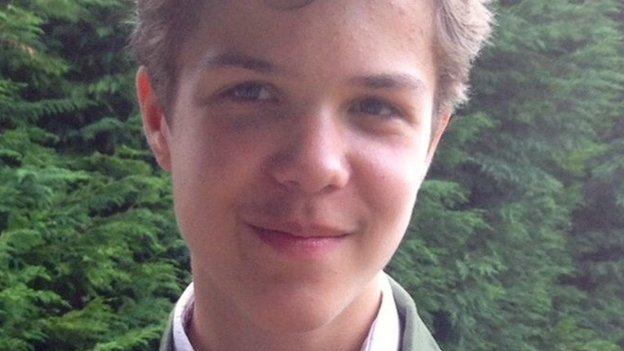IPCC: Grooming reports to police 'need better handling'
- Published
Breck's mother told police she was concerned he was being groomed
Police chiefs are being urged to tackle reports of grooming more effectively after the murder of a teenage boy who was befriended online by his killer.
Breck Bednar, 14, from Surrey, was stabbed to death by Lewis Daynes, then 18, in his Essex flat in February 2014.
Weeks earlier, Breck's mother reported a change in his behaviour to police.
An Independent Police Complaints Commission (IPCC) inquiry found her call should have alerted officers to the possibility he was being groomed.
In January, computer engineer Daynes was sentenced to life in prison and told he must serve at least 25 years.
Chelmsford Crown Court heard how he lured Breck to his flat in Grays, Essex, after months of talking online on gaming websites and social media.
Mrs Justice Cox, sentencing, said she was sure the murder was "driven by sadistic or sexual motivation".

Lewis Daynes will serve a minimum term of 25 years for the murder of 14-year-old Breck Bednar
The IPCC says it has written to the relevant National Police Chiefs' Council (NPCC) lead officers to urge them to share best practice nationally on the handling of grooming reports.
The investigation found the Surrey Police call handler - who spoke to Breck's mother, Lorin LaFave, in December 2013 - and their supervisor lacked knowledge of dealing with grooming concerns.
It also found Ms LaFave was not provided with information about specialist agencies, such as the Child Exploitation and Online Protection Centre, which provides a reporting service and advises parents who suspect their child may be being groomed.
The IPCC added that a Police National Computer check should have been completed.
A record had existed on the national database for Daynes for a previous alleged rape of a minor in 2011 in Essex.
'Danger signs'
IPCC commissioner Jennifer Izekor said parents were increasingly aware that child abusers or extremists could use the internet to target victims online.
"Where they have concerns, parents must be able to turn to the police and expect those concerns to be taken seriously," she said.
Police call handlers needed to be properly trained to recognise the danger signs and to give the right support and information, she added.
"Sadly, in the case of Breck and his family, the support they needed was not given.
"Lessons must be learned; that is why I have written to the NPCC to ask them to consider current national guidance and to alert forces across England and Wales to our recommendations, so forces can satisfy themselves that they have the right training and procedures in place."
IPCC investigators previously served a misconduct notice on a staff member at Surrey Police contact centre. Another staff member, who took the call, resigned from the force last August.
The IPCC said that, had both of them stayed in the force, they would have had a case to answer for misconduct.
Surrey Police said it carried out a review of practices in its call handling centre and implemented changes to improve the way information was handled and shared.
- Published12 January 2015

- Published12 January 2015

- Published12 January 2015
